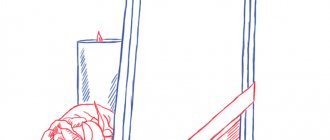A ritual hall is a special place where relatives say goodbye to the deceased. It can hold both a memorial service and a funeral service for the deceased. This is a comfortable place where all the conditions are created for a noble and calm farewell, even if with the participation of a large number of people.
The ritual halls are well ventilated, air-conditioned, and have a beautiful surrounding area. Each room is maintained at a temperature recommended by Sanitary Regulations and Regulations, which prevents the spread of viruses. The ritual hall is cleaned every day with a variety of cleaning and disinfecting agents to ensure the safety of mourners.
Each hall is equipped not only with a pedestal on which the coffin of the deceased is placed, but also with all the necessary farewell paraphernalia. Thus, the ritual hall is an ideal place to say goodbye to the deceased. However, few of us have been to such places. Where to stand and where not to stand, when to go to say goodbye, how to do it correctly - all these questions torment those who are about to say goodbye in the ritual hall, and we will try to answer them within the framework of this article.
Prohibitions associated with the coffin
You should not put any objects related to the living in the coffin, for example, photographs, personal belongings, children's toys, etc. According to tradition, it is believed that such actions have a bad effect on the health and life of the person to whom the object placed in the coffin belonged. The same applies to things that the deceased is dressed in - you cannot use another person’s things for this. Any objects are never transferred to each other through the coffin. They often make the mistake of placing fresh flowers in the coffin. For this purpose, only artificial or dried plants are used, for example, willow branches, blessed on Palm Sunday and kept behind the images.
Funeral procedure
Most often, the deceased is buried in a narrow family circle, especially if he was a famous person or did not like hype during his lifetime. In such cases, it is considered bad form to attend a funeral without an invitation. They invite everyone whom the relatives want to see at the funeral ceremony.
If the death of a person becomes known from public sources, and information about the date and time of farewell is published there, everyone can come to the funeral.
In such cases, only close relatives have the right to stand at the coffin, and the rest of those present approach them to express condolences and say goodbye to the deceased. You can support the family and friends of the deceased with a slight nod of the head or a short handshake. But loud and long speeches at such a moment would be completely inappropriate. It is allowed to talk a little with others on personal topics, but very briefly and without emotion.
Correct behavior at farewells and funerals
It is considered a mistake if, during the burial of a loved one, one of the relatives cries uncontrollably. Folk tradition claims that out of pity for this relative, the deceased soon takes him with him. They do not speak about the deceased in a negative way, much less scold or insult him, no matter what he did during his lifetime. The rule “It’s either good or nothing about the dead” has been observed for a long time. Relatives should refrain from hugging at a funeral, even if they have not seen each other for a long time. If there is a deceased person in the house, then when meeting a friend or relative there, they do not greet out loud, but only by bowing their heads. While the deceased is in the house, one should not sweep the floor, take out the rubbish, or do laundry. Before the funeral, friends and relatives come to say goodbye to the deceased, but 20 minutes before the removal of the coffin with the body, only the closest relatives should remain with it. The removal is carried out in the following order: first the wreaths and the portrait of the deceased, followed by the lid of the coffin with the narrow part forward, then the coffin itself with the foot forward. At the same time, they especially try not to touch either door jambs or lintels. In the house, mirrors are curtained or turned “facing” the wall. As a sign that a person’s life journey is completed, all clocks are stopped. After the coffin is taken out of the house, all floors must be washed with water alone, and this is done not by a relative, but by a stranger. When cleaning like this, they often make the mistake of sweeping the floor to the threshold. It is necessary, on the contrary, to take revenge deeper into the house. After cleaning, throw away the rag and broom.
Organizing a funeral requires a set of actions that are carried out promptly, carefully, taking into account specific circumstances.
Funeral arrangements
How to say goodbye to the deceased
According to tradition, people at a funeral are placed as follows: relatives are to the left of the deceased, and friends and acquaintances are to the right. Those present at the cemetery approach the relatives of the deceased, hug them, offer help and say words of condolences. Men must attend the ceremony without hats, caps or caps. If this is not possible due to winter frosts, then headdresses are removed at least while the coffin is being lowered into the grave as a sign of farewell and respect.
During the cemetery ceremony, it is customary to kiss the deceased. When approaching the deceased to say goodbye, you need to try not to step on the towel that is placed near the coffin. During a funeral, you should not visit the graves of relatives and friends who are interred in the same cemetery.
Sometimes loved ones perform a civil memorial service before the burial. Considering that they either speak well of the dead or nothing, the farewell speech should consist of words of gratitude to a loved one. Before burial, the deceased's legs and arms are removed and placed in the coffin. After the end of the ritual, wreaths are laid on the graveyard. On the eve of departure, it is customary to say goodbye and stand briefly in front of the grave in silence. After the funeral is over in the cemetery, they shake off the earth from their feet on the threshold of the house, and upon entering, they briefly hold their hands over the flame of a candle for symbolic cleansing.
Mistakes related to funeral processions
Relatives, even the most distant ones, should not walk in the funeral procession in front of the coffin and should not carry the coffin itself. You should not look at the funeral procession from a window or through the cracks of a fence, so as not to invite disaster on yourself. At this moment the men take off their hats. It would be a mistake to cross or cross the road before a funeral procession. Some see this as extreme disrespect for the memory of the deceased, while others predict the biggest troubles for those who do not give way to the funeral procession.
Father's comment
Father Vladimir
Clergyman
When organizing a funeral, you should rely on the canons of Orthodoxy; it is recommended to ask the priest or your confessor for advice. Previously, they grieved openly, this allowed them to pour out the pain and accept the death of a relative. But today the standards of decency deny this possibility. The religious view on this issue is somewhat different: grief must be lived through, one cannot withdraw into oneself, moreover, strong grief leads away from God, because at this stage a person mourns not the deceased, but himself. Jesus Christ also cried after the death of a friend, but not because of the loss, but out of compassion for his grieving relatives. This means that you can grieve, but you need to remember that death is part of life, just a stage of transition.
Prohibitions regarding cemeteries
No items are taken from the cemetery, except those that can be distributed by the relatives of the deceased. If during burial some belongings of those present fall into the grave, they are not removed, even if they are valuable items. Such cases are symbolically interpreted as the recovery by the deceased of what he did not receive during his lifetime. Quarrels, disputes, curses and any conflict situations in the cemetery are considered the gravest mistakes. Immediately after the funeral, it is not recommended to visit the graves of other relatives or friends located in the same cemetery. The day of the funeral should be dedicated to only one deceased person.
Farewell service in church
The Church teaches that the soul of the deceased cannot intercede for the forgiveness of his sins. This is done by relatives and clergy. It is important to behave correctly in the temple before the funeral, when the service is being performed. Otherwise, you can nullify the entire power of the ritual. Recommendations:
- how to pray correctly: they say a prayer together with the clergy, but this can be done by churchgoers or those who often read the prayer book at home (the spoken texts are familiar, like the Old Church Slavonic language), turn to God sincerely, with all their hearts, without misleading themselves and Almighty;
- handkerchiefs for candles: funeral gifts are often distributed to all those present, usually these are handkerchiefs, but in some regions similar things are given at the end of the funeral ceremony, the function of handkerchiefs is to wipe away tears, prevent burns from the flowing hot wax of candles;
- cover your head with a scarf: in Christianity, since the time of the life on earth of the Son of God, girls and women covered their heads with a scarf, this is still considered correct, especially if the relatives of the deceased came to say goodbye to him in the cemetery, the scarf symbolizes purity, humility, fidelity - to her husband, family , Christian faith, without it women should not attend temple;
- church about expressing sadness: when they come to a funeral, not everyone knows how to behave correctly, one must show restraint, the Orthodox faith prepares church parishioners for Eternal life in the Kingdom of Heaven, which means that strong grief will show how close ones are (grandparents, mother, dad, husband, etc.) are selfish, because they do not care about the soul of the deceased, but about themselves - they experience their own pain.
Funeral service in the church
About magic at funerals
During and in connection with funerals there are people who try to perform or prepare magical actions. This does not happen as rarely as we would like in the 21st century. Therefore, you cannot accept any objects from all kinds of strange personalities in the cemetery. It is better to avoid those whose clothes are worn inside out. The ties removed from the hands and feet of the deceased must be placed in the coffin. Otherwise, they can be used to cause damage.
If, during landscaping of a cemetery site, while weeding and loosening the earth, objects are dug up that should not be there, they must be taken out of the cemetery, making sure to protect your hands with at least gloves, and burn them. Water after washing the deceased should also be handled with great care. They dig a hole for her where people don’t go. All this water, to the last drop, is poured into the prepared hole and covered with earth. Such precautions are due to the fact that for death conspiracies, it is the water with which the deceased was washed that is used. It should not be given to anyone, no matter who asks for it. The same is done with the water that was used to wash the floor after removing the coffin.
In Belarus, especially in Polesie, local funeral customs have long been preserved. They are usually well known to people of the older generation. In order to avoid making mistakes, you need to take their advice into account when organizing a funeral.
Queue to the deceased
The order that people follow when saying goodbye is associated with two criteria: closeness to the deceased and status, both family and social. Family members are always the first to say goodbye, then relatives - from the closest to the most distant, followed by friends, colleagues and neighbors.
The article “The Magic of Communications in the Funeral Rituals of the Russians of the Kazan Volga Region” is devoted to this topic, which was co-authored by Doctor of Historical Sciences Guzel Stolyarova, Candidate of Historical Sciences Nadezhda Rychkova and postgraduate student of Mari State University Olga Danilova. The joint work of scientists was published in the journal “Bulletin of the Mari State University” (Vol. 3, No. 2, 2017). In it, the researchers noted that the order of farewell reflected both the intrafamily hierarchy and the degree of relationship between a person and the deceased.
“Moreover, at the beginning the head of the family group in which the deceased lived said goodbye. The first to say goodbye to the deceased father or mother was the son with whom they lived, as a rule, it was the youngest son, then all the other sons and daughters in order of seniority, then the grandchildren (boys and girls), then the daughters-in-law, and the first of them was the one who lived with them,” wrote G.R. Stolyarova, N.V. Rychkova and O.N. Danilova.
This order was observed especially strictly by the Old Believers, among whom many ancient customs and rituals were better preserved.
It is noteworthy that the principle of “seniority” also applied when bidding farewell to the deceased of his colleagues. Thus, the boss who attended the funeral approached the coffin earlier than ordinary employees. If they were all equal in social status, then primacy went to the oldest colleague. The same principle was observed when neighbors and acquaintances said goodbye to the deceased.
Question and answer
Does anyone these days still believe in damage and the evil eye at funerals?
Everyday experience proves that so-called “household magic” is actually quite common. Whether it brings results is a complex question, and the answer to it is ambiguous. In any case, as long as there remains at least some likelihood of negative consequences, it is better to refrain from certain actions.
It is usually advised to get rid of the deceased's belongings. And if the thing is dear as a memory of him?
In this case, it is better to proceed from personal feelings. If some item is associated with warm feelings and a bright memory of the deceased, it would not be a mistake to leave it.
The dead hear everything
During farewells, people, as a rule, take turns addressing the deceased, saying everything that they wanted to say during life, but did not have time or were unable to. Relatives ask for forgiveness from the deceased if they consider themselves guilty of something in front of him, and also wish him: “May the earth rest in peace.” This tradition is based on the idea that the soul of the deceased is next to the body during the funeral, and therefore hears everything that the participants in the mourning ceremony say.
This fact was noted by the famous philologist-folklorist Dmitry Zelenin in his book “East Slavic Ethnography”, the first edition of which took place in Germany in 1927. The researcher wrote that, for example, such customs as inviting mourners are based on people’s confidence in the ability of the deceased to hear everything that happens at the funeral and singing cheerful songs after performing all the necessary rituals.
A woman's lamentations should show the dead soul that she was worthy of mourning. And a demonstration of a good mood is to convince the deceased that everything is fine with his living relatives, and he can go to the afterlife without worrying about anything.
It is not surprising that farewell to the deceased resembles seeing off a person on a long journey.
Reviews
Read all reviews >>>
February 22, 2022
Many thanks to Arthur Dmitrievich Yakovlev for good organization and tact during this difficult period for me.
Oleg
February 19, 2022
Many thanks to Yuri Alexandrovich Pustokhod and the team of the City Ritual Service. Mom died on the evening of December 30th. I called several services. Many simply did not work on the holidays...
Natalia
Rate material
Next >>
When is the funeral service held?
This part of the funeral ceremony is considered optional, and in some cases it is even prohibited.
According to the rules, the funeral service is organized on the third day after death, but should not take place on Christmas and Easter. The essence of the procedure comes down to a request for forgiveness of the sins of the deceased, which is expressed by the clergyman during the process of rites.
It is forbidden to perform funeral services for those who committed suicide, that is, they themselves abandoned God’s valuable gift. A similar prohibition applies to people who, during their lifetime, publicly renounced their faith or mocked religion.
What flowers should I bring?
First, you should decide in what status you are attending the funeral. If you have to act on behalf of an organization or colleagues, then purchase a ritual wreath. It is advisable to immediately decorate it with a mourning ribbon with the inscription: “From a friendly team” or a longer one “To our best employee. Everlasting memory".
For the ceremonial farewell of a famous person, it is customary to bring decorated floral ensembles - baskets, wreaths, bouquets - and preferably of fresh flowers. In this way you demonstrate that the memory of the person is alive in your heart.
The last option is that you are present “on your own behalf” at the burial of a relative, acquaintance or neighbor. A closer acquaintance determines your attitude towards the family of the deceased. In this case, any flower arrangement, either a custom one or a bouquet of two roses, is quite appropriate. Just remember to remove the cellophane from the latter when placing it.
Important! Jews and Muslims do not accept flowers at funerals, but Buddhists bring garlands of freshly cut inflorescences to the datsan (temple).
What to do at a wake?
When answering the question of how to introduce yourself at a wake after a funeral procession, you need to realize that regardless of the status of the deceased person, the dinner should be modest and restrained. This action is a tribute to the memory of the deceased, and not a ceremonial event.
In view of this, you should not have a funeral dinner in an expensive restaurant. A narrow circle of relatives, close people, and work colleagues are invited to the wake. Particular attention is paid to the process of table setting. It is recommended to use plain tablecloths and tableware sets. Of the cutlery, only spoons are used at funerals. Instead of bread, plates with soft rolls and pies fall on the table. Before starting to eat food, a funeral speech is made about the deceased, after which the guests begin dinner.
Among the dishes that need to be put on the table, it is worth noting:
- Kutyu.
- Mashed potatoes.
- Borscht or fish soup.
- Vegetable Salad.
- Meat, cutlets or fish.
- Pies.
- Pancakes.
- Compote.
As for alcoholic drinks, the relatives of the deceased themselves decide how to remember him.
Farewell to the body of the deceased
The opportunity to see the deceased may be extremely important in this situation. Traditional Slavic funerals allow you to do this in most cases. Spend as much time as you can next to the coffin and say goodbye to yourself or, if the situation allows, out loud.
If the funeral is held with the coffin lid closed, you can say goodbye to the body of the deceased in the morgue before the service begins. Of course, if you are not a direct relative of the deceased, you will need to coordinate your wishes with them, in person or by telephone.











